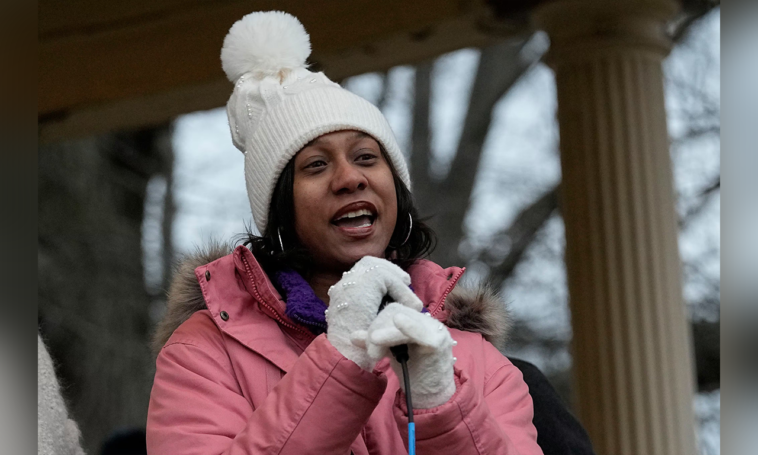Ohio Woman Cleared of Corpse Abuse Charge After Miscarriage Triggers Legal Debate. In a remarkable turn of events, an Ohio grand jury declined to charge 34-year-old Warren woman Brittany Watts with corpse abuse after a home miscarriage. After Roe v. Wade was overturned, the case gained national attention and fueled the reproductive rights issue.
The Trumbull County prosecutor stated Thursday that the grand jury declined to indict Watts. Following charges that Watts miscarried at home and left a 22-week-old fetus in the pipes, a municipal judge established probable cause to bind over her case.
Watts attended Mercy Health-St. Joseph’s Hospital several times before the miscarriage, when her doctor told her she was carrying a nonviable fetus and faced a “significant risk” of death if she didn’t induce labor. After delays and issues, she left the hospital untreated. The home miscarriage prompted a police inquiry and Watts’ first charge.
Traci Timko, her lawyer, thanked the community for its support during the difficult three months.
Timko said, “No matter how shocking or disturbing it may sound when presented in a public forum, it is simply the devastating reality of miscarriage.”
The case started a discourse regarding pregnancy outcomes’ legal implications, especially in states considering new reproductive healthcare regulations. The prosecutor’s initial case concentrated on the alleged mishandling of the miscarriage following, regardless of the cause.
Warren Assistant Prosecutor Lewis Guarnieri claimed during preliminary proceedings that the issue was not how the infant died but what happened later. The prosecutor claimed Watts left the toilet-clogging fetus unattended when she went about her day.
Reproductive rights advocates welcomed the grand jury’s verdict notwithstanding the municipal judge’s binding over. Black reproductive rights organization In Our Own Voice sees Watts’ case as an example of Black women’s legal risks for existing. The group welcomed the grand jury’s verdict and called for a halt to the “dangerous trend” of criminalizing reproductive outcomes.
Ohio Physicians for Reproductive Rights, a leading reproductive health care advocate, applauded the grand jury’s finding and called for an end to criminalizing reproductive results. The group said such practices violate women’s rights and threaten public health by making vulnerable women afraid to seek medical care.
At a Warren event, Brittany Watts thanked supporters and hoped her tale would inspire change.
Brittany Watts’ case, which has become emblematic of reproductive rights issues, shows the necessity for a comprehensive legal framework that treats miscarriage. Watts’ legal battle is ended, but it reminds us of how legal institutions may collide with extremely personal and frequently terrible situations.
The criminalization of reproductive outcomes disproportionately affects women, especially women of color, say reproductive rights campaigners. The case emphasizes the necessity to understand reproductive health, including abortion access and compassionate legal responses to pregnancy loss and miscarriage.
After the Roe v. Wade decision, states have struggled with legislative adjustments, creating a patchwork of regulations that often don’t address Watts’ issue. Watts’ defense team said that Ohio’s abuse-of-corpse act lacks precise terminology, highlighting reproductive health legal ambiguity.
The grand jury’s refusal to indict Watts implies it understood the intricacies of such cases. It emphasizes the need to distinguish criminal behavior from the highly personal and frequently sad circumstances of miscarriages. However, Watts’ legal case shows the greater issues women may face when the legal system interferes with reproductive health.
Reproductive rights advocates worry that women are being surveilled, detained, prosecuted, and punished for pregnancy loss, especially in states with stringent abortion legislation. Criminalizing such events raises problems about women’s rights and may harm public health by making vulnerable patients afraid to seek medical care.
As the nation debates reproductive rights, the desire for comprehensive legislation that considers pregnancy outcomes is growing. After Watts’ case, discussions concerning precise legal definitions, reproductive health legal sensitivity, and a more compassionate and understanding attitude are arising.
Brittany Watts’ tragic and complicated legal journey can now spark change. Advocacy, education, and legislative reform aim to prevent women from experiencing the pain of navigating a legal system that ignores reproductive health issues. Watts’ attorney Traci Timko wants to make sure no lady has to battle for her freedom despite her anguish.




One Comment
Leave a ReplyOne Ping
Pingback:Ex-Cop Gets 30 Days In Jail For Killing Unarmed Black Man
Join the Community and Be a Part of the Conversation
You must be logged in or registered to post a comment.